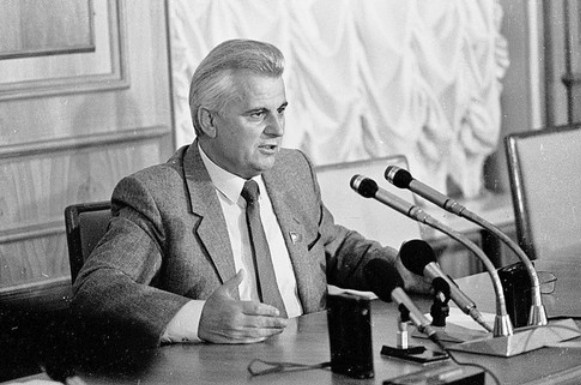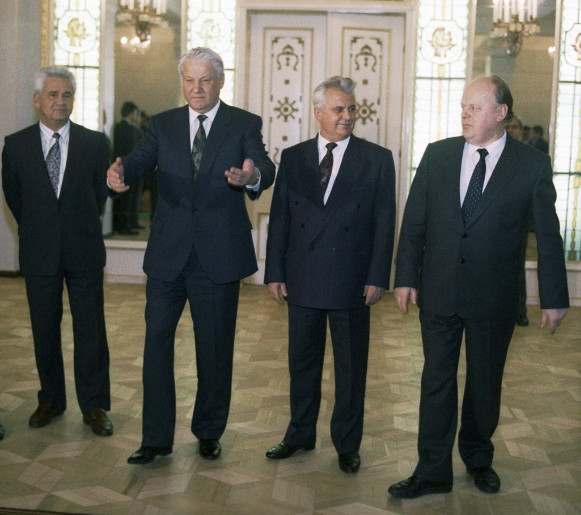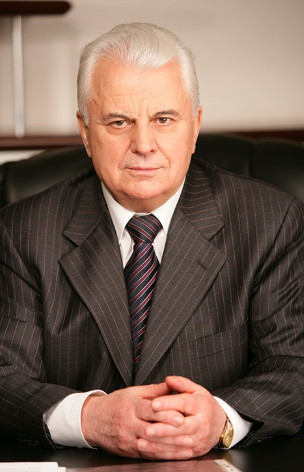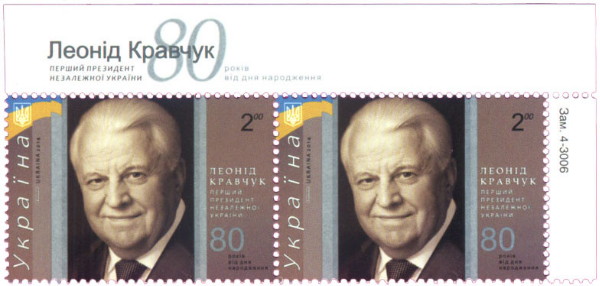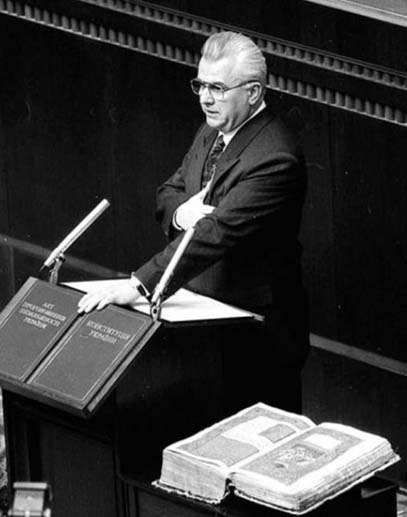Kravchuk, Leonid
Kravchuk, Leonid [Кравчук, Леонід; Kravčuk], b 10 January 1934 in Velykyi Zhytyn, Rivne county, Volhynia voivodeship, d 10 May 2022 in Kyiv. First president of independent Ukraine (December 1991–July 1994) and former CPU official. Kravchuk graduated with a degree in economics (1958) from Kyiv University and later (1970) acquired a candidate of economic sciences degree from the CC CPSU’s Academy of Social Sciences of (the advanced school for Soviet Party propagandists and ideologues) in Moscow. His dissertation dealt with the nature of income under socialism and its role in collective-farm production. Kravchuk joined the CPU in 1958 and was initially (1958–60) employed as a lecturer in political economy at a tekhnikum in Chernivtsi. Thereafter he was a full-time CPU functionary, advancing from political-education officer to head of the propaganda-and-agitation department of Chernivtsi oblast’s CPU Committee. In 1970 Kravchuk joined the staff of the CC CPU in Kyiv and worked his way up there from sector chief to head of the propaganda-and-agitation department in 1980 and head of the ideology department in October 1988. On 18 October 1989, at the time of the ouster of CPU First Secretary Volodymyr Shcherbytsky, Kravchuk was appointed an unranked secretary of the CC CPU and promoted to candidate member of the CPU Politburo. In June 1990 he advanced to full Politburo membership and became second secretary of the CPU. In July 1990 he was elected a member of the CC CPSU.
At that time Kravchuk represented the more moderate wing of the CPU leadership that was more attuned to Mikhail Gorbachev’s perestroika reforms. (Stanislav Hurenko headed the CPU’s more clearly conservative wing.) But Kravchuk was no liberal: he also placed obstacles in the way of the development of the Popular Movement of Ukraine (Rukh) and forbade CPU members to join it. Nevertheless, in keeping with his well-earned reputation for skilful maneuvering, Kravchuk took the unprecedented step of speaking at the inaugural congress of Rukh and was later said to have adopted nine-tenths of the movement’s program into his 1991 presidential campaign. Thus he rode to victory on the wave of popular support for national independence at the time of the election on 1 December 1991, and he endeavored to continue doing so throughout his term of office.
From March 1990 to December 1991 Kravchuk represented a Vinnytsia oblast constituency in the parliamentary Supreme Council of Ukraine (SCU), and from 23 July 1990 he was that legislature’s chairman. Having already resigned as second secretary of the CPU in September 1990, he thus left the leadership of that party to the more conservative Stanislav Hurenko and became, in effect, leader of the ‘national communist’ tendency in the SCU. As such, Kravchuk prevailed on a majority of parliamentary deputies to support adding a second question asking for public support for the Declaration on the State Sovereignty of Ukraine (adopted on 16 July 1990) to the referendum sponsored by Mikhail Gorbachev and scheduled for 17 March 1991. This second question received the approval of 80.2 percent of Ukraine’s voters, thus providing Kravchuk leverage in negotiating a looser Union (ie, USSR) treaty. In the negotiations, which began just outside Moscow at the Novo-Ogarevo estate in April, he took a moderate position, advocating a union of sovereign states without dismantling the USSR. Extra-parliamentary pressures for independence and weakening solidarity among the Communists in the SCU, however, resulted in the delayed consideration of the treaty until September, effectively allowing Kravchuk to avoid getting locked into Gorbachev’s plans and to frustrate not only Gorbachev but also Hurenko. From mid-1991 Kravchuk increasingly became a spokesman for national communism.
Kravchuk’s nationalism was severely tested at the time of the abortive Moscow coup of 19 August 1991. He initially neither condemned nor approved the coup, and he did not end his equivocation until two days later. By that time there were calls for Kravchuk’s resignation, which he avoided by resigning first from his Party positions and, on 27 August, from the Party itself. (His official biography claims this happened on 19 August.) The upshot in Kyiv of the coup was the SCU’s approval of the 1991 Ukraine’s Declaration of Independence on 24 August 1991. Thereafter Kravchuk took measured steps to relabel important components of the Soviet Ukrainian state with national designations.
Identified with the cause of independence, Kravchuk easily won the presidential election of 1 December 1991, receiving 61.6 percent of the vote. The accompanying independence referendum was approved by 90.3 percent of the voters. Armed with these results, Kravchuk met on 8–9 December with Presidents Stanislau Shushkevich of Belarus and Boris Yeltsin of the Russian Federation and secured their consent to sign the Belavezha Agreement to supplant the USSR with the Commonwealth of Independent States, thereby forcing Mikhail Gorbachev to resign as Soviet president.
Kravchuk’s term as president of Ukraine was marked by signal successes in building the newly independent Ukrainian state, as well as by notable failures to encourage the transition to consolidating democracy and a full-fledged market economy. While his handling of the external aspects of the state-building project was energetic and resulted in a high level of foreign recognition, this was accompanied by unresolved issues in Ukraine’s relations with The Russian Federation, Europe, and the West (particularly the United States).
Kravchuk used nationalism as part of his state-building efforts rather than employing the state for nation-building. The 1992–3 attempt to create a unified Orthodox ‘state church’ crumbled. Kravchuk’s idea of developing a strong state boiled down to having a strong president, advocacy of which only strengthened the resolve of the constitution writers to weaken the presidency and to have a stronger parliament. By co-opting national democrats into the government and encouraging the development of a ‘party of power,’ Kravchuk undermined the formation of a recognizable system of political parties. Similarly, he weakened grassroots democracy by introducing ‘president’s representatives’ on the model of French prefects at the oblast and local levels. Kravchuk’s economic policies were disastrous for market reforms, feeding inflation by extending credit to maintain production and yielding to strikers’ demands for wage increases. He thus sacrificed the economy for political gain, just as he did a series of prime ministers (including Leonid Kuchma).
In the first round of the presidential election held on 26 June 1994, as the incumbent Kravchuk received 37.7 percent of the vote and led a field of seven candidates. He campaigned on a platform emphasizing his statesmanship and patriotism. His nearest rival was Leonid Kuchma, an advocate of improved relations with The Russian Federation and of economic reform, who had 31.3 percent. When the two faced each other in a run-off vote on 10 July, however, Kravchuk managed only 45.1 percent to Kuchma’s 52.1. Kravchuk then retired from the presidency, retaining his official salary and most of the other perks of that office, but not from politics. In September 1994 he was elected from a constituency in Ternopil oblast to the parliament of Ukraine, where he joined the Social-Market Choice caucus (led by Volodymyr Shcherban) and became a member of the parliamentary Commission on Issues of Culture and Spirituality.
After retiring from the presidency, Kravchuk also served for two years as president of a foundation in support of the arts. In July 1997 he was appointed head of the State Committee for the Introduction of Administrative Reforms in Ukraine. In January 1998 he joined the United Social Democratic Party of Ukraine (SDPU[O]), a vehicle for big-business oligarchs, and on 29 March 1998 he was re-elected a member of parliament at the head of that party’s list of candidates in the general election. While a member of the SDPU(O) caucus (led by ex-prime minister Yevhen Marchuk) in parliament, Kravchuk was also on the latter’s Committee for Foreign Affairs and Relations with the CIS.
Kravchuk’s presidential term is remembered as setting the foundation for Ukraine’s independent statehood. Beyond that, his failures in constitutional reform and economic management created conditions that seriously threatened this achievement. The years following his presidency have been marked by political instability and challenges to the country’s integrity.
Since leaving office, Kravchuk has remained active politically. From September 1994 to April 2006 he served as a member of parliament and its Committee for Foreign Affairs (June 2002–April 2006), and headed the SDPU(O) caucus (2002–6).
In the 2004 presidential race Kravchuk backed Viktor Yanukovych, negotiating on the latter’s behalf in the political conflict otherwise known as the Orange Revolution. Kravchuk’s final run for a parliamentary seat was in 2006, when he led the Ne tak! (‘Not like That!’) Opposition Bloc —its name a rebuke to Viktor Yushchenko and the Orange forces’ ‘Tak! Yushchenko’ (Yes! Yushchenko) electoral campaign. But his bloc failed to cross the three-percent electoral threshold.
During the 2010 presidential election Kravchuk abandoned Viktor Yanukovych to support Yuliia Tymoshenko, leader of the Batkivshchyna party. His activities during the 2013–14 Euromaidan Revolution were typically ambiguous: on the one hand, he warned that the country was ‘on the brink of civil war’ while, on the other, he rejected direct negotiations with the Russia-backed rebels in the Donbas. In 2015 President Petro Poroshenko appointed Kravchuk to a 72-member constitutional commission charged, among other things, with strengthening the status of local communities and annulling the immunity of parliamentarians and judges. The commission began its work in April 2015, but nothing was heard of it thereafter.
On 28 July 2020, when Leonid Kuchma resigned as head of the Ukrainian delegation to the Trilateral Contact Group working since 2014 to resolve the war in the Donbas, he was replaced by Kravchuk whose appointment he had been advocating since 2015. Kravchuk in turn brought in Vitold Fokin, Ukraine’s first prime minister, as his first deputy, but controversial remarks by the two of them interpreted as being at odds with Ukraine’s national interests resulted in Fokin’s early dismissal. Despite Kravchuk’s continuing interest in foreign policy during his retirement as well as his vision of inevitable EU and NATO membership, doubts were raised about the suitability of his appointment. Kravchuk had been a consistent critic of the Minsk process up to that time.
BIBLIOGRAPHY
Kravchuk, Leonid. “Our Goal—a Free Ukraine”: Speeches, Interviews, Press Conferences, Briefings (Kyiv 1993)
Lytvyn, Volodymyr. Politychna arena Ukraïny: Diiovi osoby ta vykonavtsi (Kyiv 1994)
Motyl, Alexander J. Dilemmas of Independence: Ukraine after Totalitarianism (New York 1994)
Chemerys, Valentyn. Prezydent: Roman-ese (Kyiv 1994)
Kuzio, Taras, and Andrew Wilson. Ukraine: Perestroika to Independence (Edmonton and Toronto 1994)
Litvin, Vladimir [Lytvyn, Volodymyr]. Ukraina: Polityka, Polityka, vlast' na fone politicheskogo portreta L. Kravchuka (Kyiv 1997)
Kuzio, Taras (ed). Contemporary Ukraine: Dynamics of Post-Soviet Transformation (Armonk, NY 1998)
———, Robert S. Kravchuk, and Paul D’Anieri (eds). State and Institution Building in Ukraine (New York 1999)
D’Anieri, Paul, Robert Kravchuk, and Taras Kuzio. Politics and Society in Ukraine (Boulder 1999)
Nahaylo, Bohdan. The Ukrainian Resurgence (Toronto 1999)
Harasymiw, Bohdan. Post-Communist Ukraine (Edmonton and Toronto 2002)
Kravchuk, Leonid. Maiemo te, shcho maiemo (Kyiv 2002)
———. Odna Ukraïna, iedynyi narod: Politychni rozdumy had zapysamy v shchodennyku (Kyiv 2010)
Bohdan Harasymiw
[This article was updated in 2020.]
